Things the guys who have my stolen phone have texted me to try to get me to unlock it
Plus: OpenAI's Scarlett Johansson theme-park ride, and bumper stickers... are they back?
Greetings from Read Max HQ! In today’s newsletter:
A guest post from Veronica de Souza about making friends online (with the guys who stole your iPhone)
An important trend-spotting question: Are bumper stickers back??
A new way of thinking about ChatGPT-4o following the news that Scarlett Johansson is considering suing OpenAI.
This is a long post with a lot of images so please click here to read it on the website.
Sadly, for logistical reasons, there will be no Read Max Experimental Audio product this week. Next week we’ll be back!
Finally, your weekly reminder: This newsletter is just one guy (me), producing around 5,000 words every week for the entertainment and enlightenment of 33,000 total subscribers. If you find yourself entertained or enlightened--if you read every week and enjoy yourself enough to buy me one beer a month--consider becoming one of the less than ten percent of readers who are paying subscribers. Every single subscription is meaningful, and the support allows me to keep this newsletter going.
If you can’t subscribe, or want to support in other ways, please forward this newsletter to people you think would like it. I have no marketing budget; my street team is my satisfied readers.
ChatGPT as a Her-themed ride
Imagine, hypothetically, that you were tasked with creating a theme-park ride based on a movie called The Talking Computer. In this hypothetical scenario, the main character of The Talking Computer is voiced by Al Pacino. Naturally, to ensure fidelity to the movie experience, you would want to get Al Pacino to lend his voice to the hypothetical theme-park ride/experience. And, in the event that Al was unable or unwilling to record new lines for your Talking Computer ride, you would almost certainly want to find a voice actor who sounded like Al. After all, the people who saw The Talking Computer want the Talking Computer they saw in the movie, not just any old talking computer!
The problem is, well, you might get sued by Al Pacino:
Lawyers for Scarlett Johansson are demanding that OpenAI disclose how it developed an AI personal assistant voice that the actress says sounds uncannily similar to her own. […]
After OpenAI held a live demonstration of the voice last week, many observers compared it to Johansson's voice in the the 2013 Spike Jonze romantic sci-fi film "Her," which centers on a man who falls in love with the female voice of his computer's operating system. […]
Johansson said that nine months ago Altman approached her proposing that she allow her voice to be licensed for the new ChatGPT voice assistant. He thought it would be "comforting to people" who are uneasy with AI technology.
"After much consideration and for personal reasons, I declined the offer," Johansson wrote.
Just two days before the new ChatGPT was unveiled, Altman again reached out to Johansson's team, urging the actress to reconsider, she said.
But before she and Altman could connect, the company publicly announced its new, splashy product, complete with a voice that she says appears to have copied her likeness.
now that we’re a few years in to the generative-A.I. craze, it seems pretty clear to me that these apps, in their current instantiation, are best thought of, like magic tricks, as a form of entertainment. They produce entertainments, yes--images, audio, video, text, shitposts--but they also are entertainments themselves. Interactions with chatbots like GPT-4o may be incidentally informative or productive, but they are chiefly meant to be entertaining, hence the focus on spookily impressive but useless frippery like emotional affect. OpenAI’s insistence on pursuing A.I. that is, in Altman’s words, “like in the movies” is a smart marketing tactic, but it’s also the company meeting consumer demand. I know early adopters swear by the tinker-y little uses dutifully documented every week by Ethan Mollick and other A.I. influencers, but it seems to me that for OpenAI these are something like legitimizing or world-building supplements to the core product, which is the experience of talking with a computer.
I recognize it’s not a perfect analogy, but in addition to “magic trick” I think “theme-park ride for the movie Her” is a useful way of thinking about ChatGPT-4o. It might be interesting, captivating, even useful in some counterintuitive way--but the main product is that you get to experience something like what it’s like to be Joaquin Phoenix in Her, much like the main product of the Universal Studios attraction T2-3D: Battle Across Time was that you get to experience something like what it was like to be Edward Furlong in Terminator 2: Judgment Day. Altman’s apparent insistence on using Johansson--going back to her twice to beg for her participation--or, eventually, a Johansson soundalike suggests to me that one of the most important qualities of ChatGPT-4o is how close the experience of the app is to its source material, in this case Her. Among the many problems with this, of course, is that, just as T2-3D does not actually feature a real T-1000 but instead film and prop work that approximates what it might be like to see a real T-1000, ChatGPT-4o is not an omniscient operating system; it’s an extremely impressive L.L.M. chatbot that produces sounds that sometimes approximate things a speaking omniscient operating system might say.
Things the guys who have my stolen phone have texted me to try to get me to unlock it
by Veronica de Souza
My friend Veronica de Souza of the great newsletter Buy Bitch recently had her iPhone stolen from her. But in order to erase and reset it, the thieves--and whoever the phone was sold to--need to get her to delete the phone from the “Find My” app. She has been sending me the increasingly elaborate and deranged text messages the thieves and fences have been sending her from Queens (and, now, China), and I asked her to write about the experience.
My phone was stolen in early March, most likely while I was standing on the platform at the York Street station waiting for the F train. Fifteen minutes later, in a food hall under the movie theater where my boyfriend and I were supposed to see Dune 2, I reached into my pocket and realized it was gone. Josh looked at the "Find My" app on his phone: My phone was “last seen” at York Street but wasn’t registering a current location. Someone had turned it off.
As quickly as possible, I did all the things you’re supposed to do when your phone is lost or stolen--mark it as lost, cut off service, and remotely erase it--and spent the rest of the night anxiously refreshing the Find My App, watching my phone move around Manhattan before finally coming to a stop at Rockefeller Center. I didn’t bother confronting the thief.
Worst of all, we didn't even see Dune 2.
After two hours in the Williamsburg Apple Store the next morning, I had a new iPhone 15 and I stopped stressing. As long as I didn’t remove the phone from my Apple account or the “Find My” app, the phone was essentially bricked to anyone without the passcode--unusable by the thieves, or the fences who I assume bought it from them. Now my phone was their problem.
Where had my phone gone? I learned (from Reddit comments--where else?) that stolen iPhones usually end up sold in bulk online, either directly by the thief or by a fence who buys stolen phones individually and then sells them in bulk. The purchasers are looking for parts or who thinks they can crack into the phones, wipe and resell them. This teenager on YouTube, for example, bought a box of stolen iPhones for $1300 on Liquidation.com:
As you can see, most of the phones she tried didn’t have passcodes but were still linked to iCloud accounts, which meant she (or anyone buying the phones) still had access to all of the original owners’ texts, emails and photos. She sent a message to each iCloud email offering to give people their phones back, but only one guy replied.
I, sadly, did not get a message from a teenaged YouTuber earnestly offering to return my stolen phone. Instead I received a series of texts from someone cycling through a number of different strategies for engaging, convincing, tricking, or scaring me into unlocking the phone for them.
Rather than being engaged, convinced, tricked, or scared, however, I was delighted. This was all the many promises of the internet commingled--international communion and international crime, mixed up in one. It was like I had my own Brother Orange (the Chinese man who somehow got a hold of Buzzfeed writer Matt Stopera’s phone, leading to a somewhat awkward trans-Pacific “friendship”), except they weren’t as nice to me, and instead of selfies they sent me visual directions for unlinking my iCloud account from the stolen phone.There was something oddly soothing about being in touch with the people who’d stolen my phone--instead of it disappearing into the ether, I knew more or less where it was, and thanks to these texts, I knew that it was a huge source of frustration to the people who’d gotten their hands on it. As the texts escalated in complexity and rage, I sympathized with their plight. I mean, not enough to unlock my phone. But we’ve all been there--sometimes you get stuck with a difficult project at work.
Here are some things the guys who stole (or later purchased) my iPhone have told me to try to get me to unlock it:
1) “Your iPhone 14 Pro is trying to pay with Apple pay in China.”
The first text I got from my new friends was sent on April 28, a few weeks after the phone was stolen, and I have to be honest … it kind of got me, at least for a second? It helped that, even though this text came from a clearly bogus iCloud email addresses, Apple’s own “helpful” iMessage feature was sort of fooled: the auto-filled contact name said “Maybe: Apple Pay.” Maybe!
At this point, my phone was in Sunnyside, Queens:
The new owners of my old phone persisted for a while with this tactic: I later got the same message again, but from a different iCloud address; two weeks after that, on May 12th, I got an identical message in which “USA” had been replaced with “China.” I guess if this was intentional it was meant to dial up the panic, but instead it made me feel cosmopolitan and sophisticated.
2) “Iv'e bought an iPhone 14 Pro I'm using, it have your messages, emails, cards, bank, notes and personal information on it”
On May 13 my pen pals reached out from a Filipino phone number, switching from the impersonal “Apple Pay warning” texts and claimed merely to be the unwitting new owners of a stolen iPhone. I appreciated this more intimate approach--the message even came from a phone number rather than email address, which was a nice touch--and I was glad to hear they were concerned about my insurance claim. “Best of luck!” I texted back.
3) “Your old iPhone 14 Pro is recycled by us, we are just recycling merchants, we are not the ones who steal your phone”
The next day, I was kindly contacted from a U.K. phone number to let me know that the people in possession of my phone simply wanted to recycle it. This was one of my favorites: Sure, there’s an implicit threat (“hackers” might “contact my family” to, what, send them thousands of photos of my dog??), but it's not just some poor sap I'm supposed to help, it's the planet. Who am I to stand in the way of recycling? I replied:
4) “The phone is going be auctioned on the black market with your personal information and everything about you that you had on it.”
I got this one on the same day (May 14), from the Filipino number, which previously had been claiming to be just some guy who’d accidentally bought my phone.
5) “Your old iPhone has been disassembled… you do not want to take it back, because it does not belong to the law of the United States”
At the same time, I got this--near-identical--message from the U.K. number. Most of the messages I was getting, I discovered thanks to Reddit, was scammer copypasta--English phrases and texts that were passed around between thieves and fences and jailbreakers to entice bereft phone owners like me.
In the end I think these two texts provide a lesson in the importance of great openers--while the previous message didn’t move me much, it’s hard not to admire the arresting visuals of the detailed iPhone breakdown, the reference to “the law of the United States, the mocking “you’ll never catch me.” It’s an incredible intro that really elevates the literary value of what would otherwise be a rote bit of vaguely threatening text ! ! ! !
In any event, I will credit them with being honest: I checked Find My and my phone was indeed in China. It looked like it was in an office building conveniently located around the corner from an Adidas store, about 8,000 miles from me.
6) “Listen! I'm going to harassed, wreck and ruin your sad, stupid low pathetic life if its not removed you mindless peasant.”
I did not like this tone from my best pal! This text (more scammer copypasta) was accompanied by two videos. One video video showed a “hacker” breaking into someone’s iPhone and going through their camera roll, which was a mix of selfies and graphic videos. Another appeared to be a screen recording of a social video of a guy showing off his gun. I guess this is supposed to be the guy named “Miami” who is gonna come kill me and my whole family “on Monday,” which was yesterday? I haven’t heard from them since.
A quick reminder: Everything you’re reading here is funded entirely by paying subscribers. If you enjoy this particular mix of fearless tech criticism and less-fearless bumper sticker roundups, consider subscribing for the low price of $5/month or the even lower price of $50/year!
Are bumper stickers back?
While Read Max is known globally for the strength, quality, and accuracy of its trend reporting and cultural forecasting, not every product of this newsletter’s intelligence desk is a “banger.” Sometimes my finely honed observational skills at the cutting edge of culture pick up on undeniable but somehow deeply uninteresting trends--the kinds of true but dull observations I might burn while flailing in an ideas meeting if I still worked in magazine. But what is the point of a newsletter if not to share “things I noticed”? So allow me to relay to you a trend forecast to which the only response can possibly be a noncommital “huh”: Bumper stickers are back, baby.
Obviously bumper stickers never precisely went anywhere, but over the last few years your stick-figure families and candidate names have been joined by a certain previously unseen category of highly ironized, hiply obscure, “internet humor”-ish sticker, generally applied to cars owned by people who you would not have in more recent decades thought of as “bumper sticker people.” The most prominent example of the New Bumper Sticker is probably the minorly viral “Keep Honking! I’m Listening to Alice Coltrane’s 1971 Meteoric Sensation ‘Universal Consciousness,’” (available for purchase from Dale Zine Shop) whose ubiquity in the graphic designer-type neighborhoods of major metropolitan areas earned it coverage in GQ in 2022.
Variably “funny” riffs on the Alice Coltrane bumper sticker appear regularly on cars in and adjacent to those graphic designer-type neighborhoods, among them (these and other images taken from Twitter; click on the photo to see the originating tweet):
The The Mummy bumper sticker is available at Yaki for $10; “I’m listening to HONKING” is here on Etsy for $8. The suck my own dick sticker is widely available; as you might imagine, versions of these stickers featuring almost any movie or album or sound or sex act you can imagine can be purchased relatively cheaply from most of the internet’s print-on-demand storefronts. To the extent there is a economic story about the resurgence of bumper stickers, it probably lies with your Zazzles and RedBubbles and Etsys and the increasing ease and cheapness with which niche or semi-personalized products can be made for (and can be found by) their markets.
The cultural genealogy of bumper-sticker renaissance is probably best located in the past decade’s revival of ‘60s-via-’90s crunchy-granola design excess. Bumper stickers in my mind are already closely associated culturally with Birkenstocks and tie-dye and other re-vivified signifiers; if the assignment is “look like a guy pulling in to a farmer’s market in the Berkshires,” your car’s bumper should be as overcrowded as your Online Ceramics shirt.
But the truth is that I don’t see many of the “It will be a great day when our schools get all the money they need and the Air Force has to hold a bake sale to buy a bomber”-type bumper stickers that would be truly authentic to the ‘90s crunchy experience. Instead there’s a premium on irony, anti-comedy, and internet reference:
For the record, I have no bumper stickers on my 2017 Honda Fit at the moment.








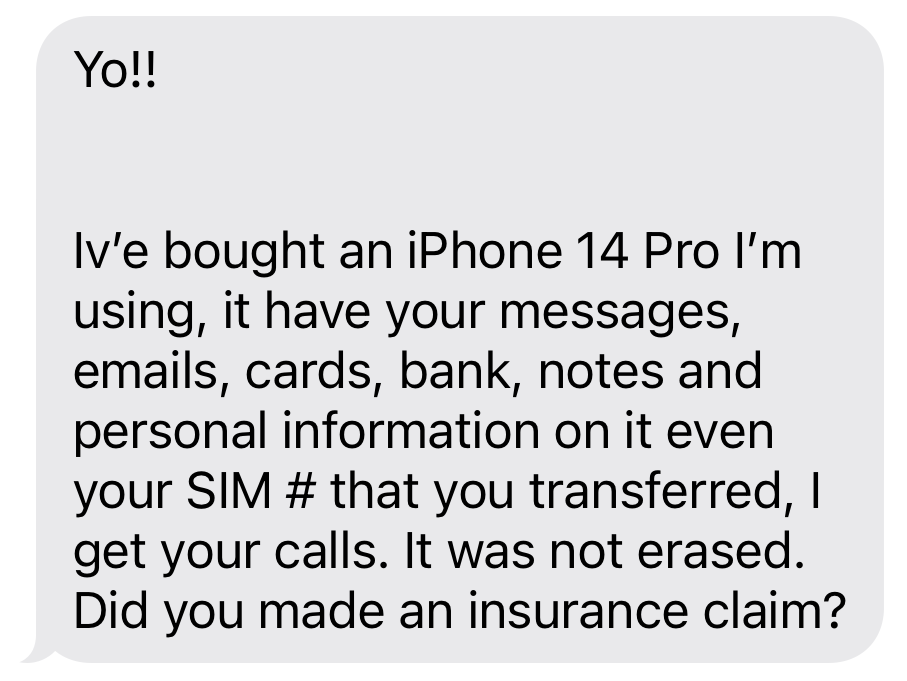


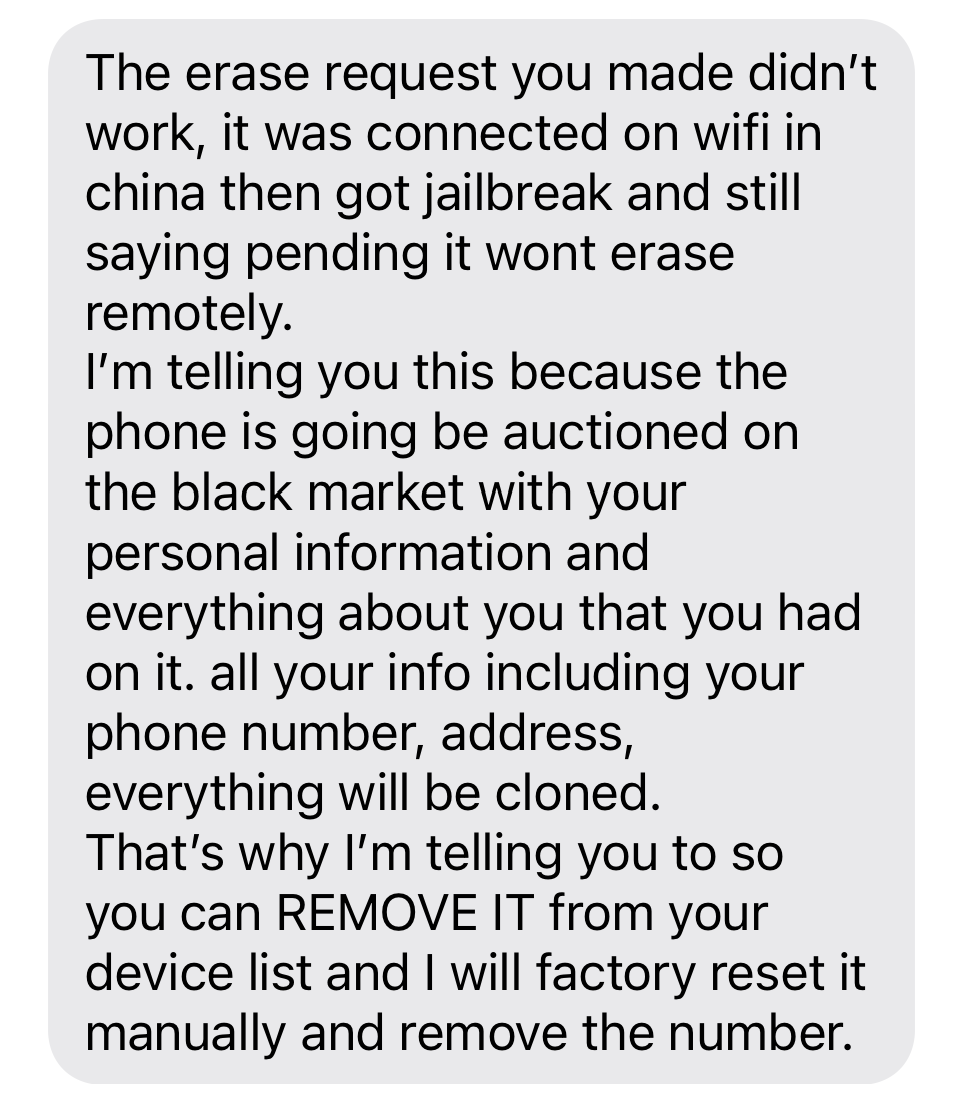

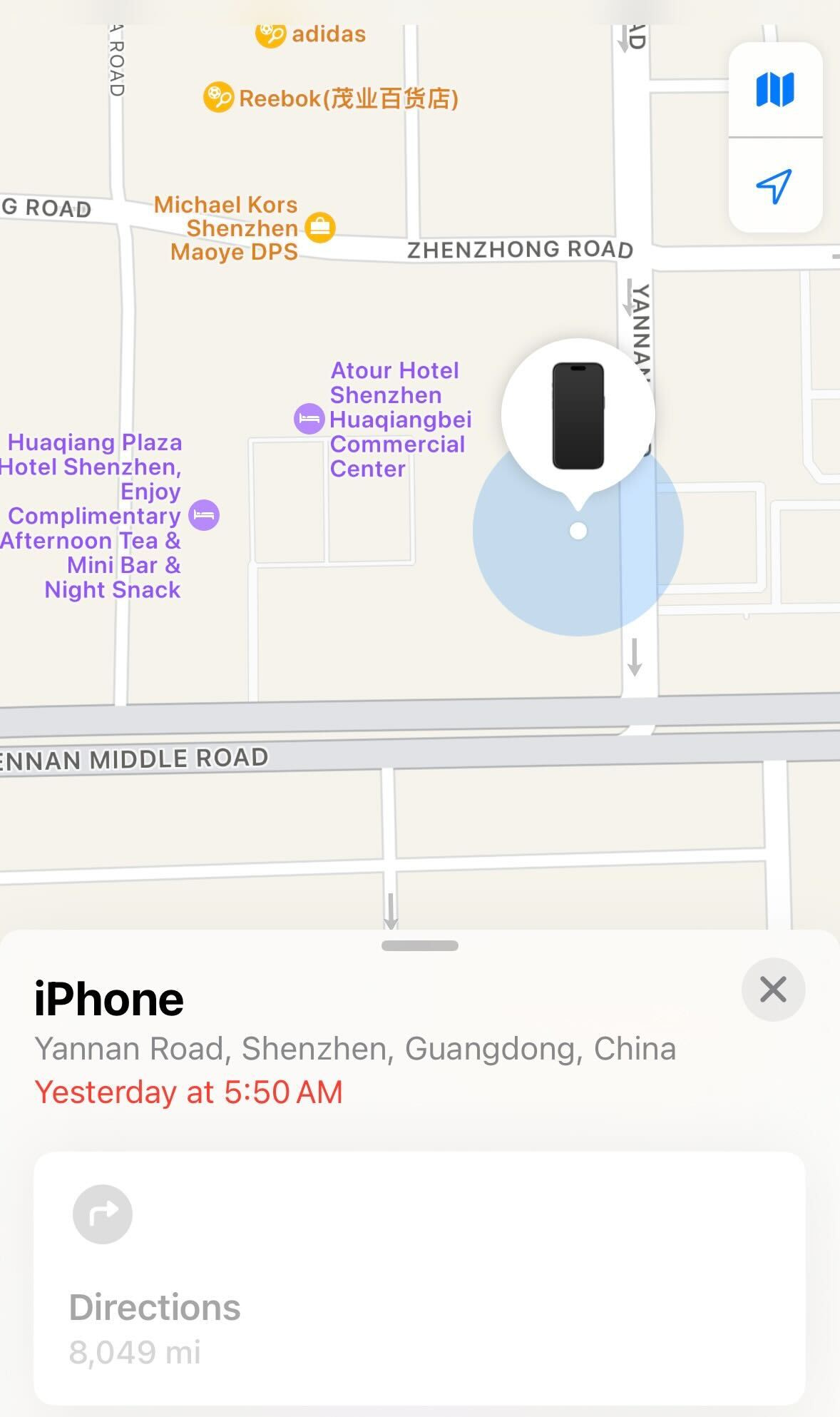



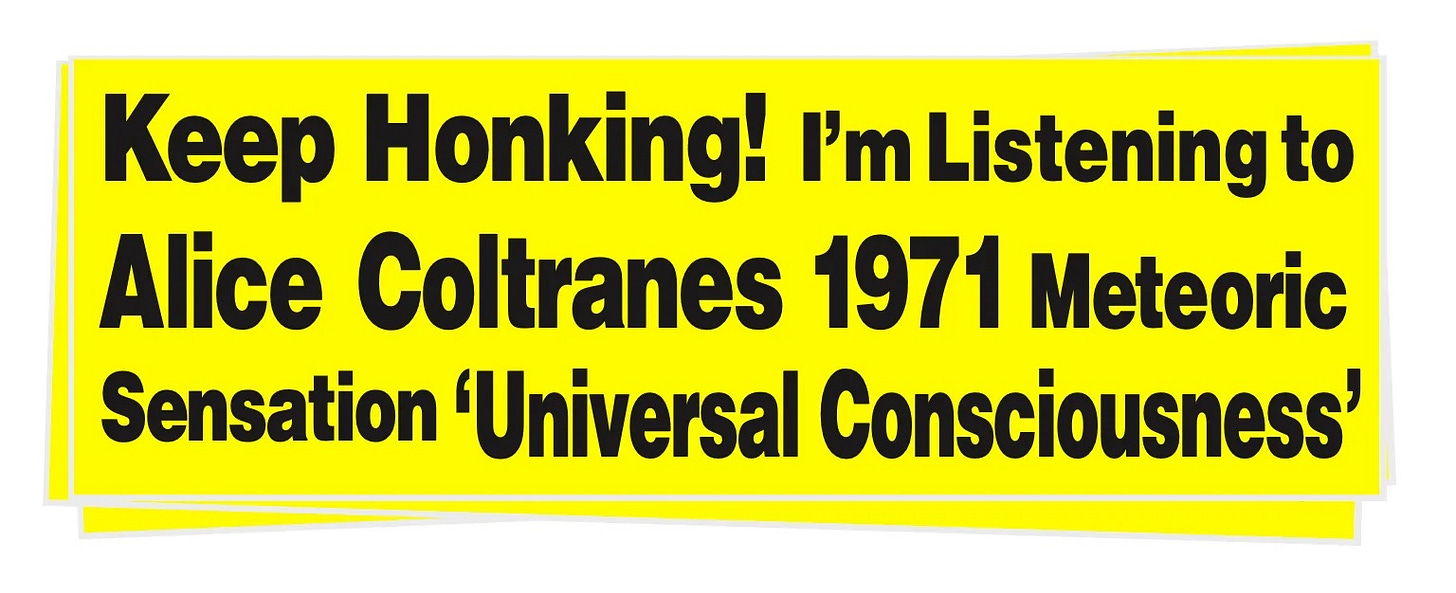
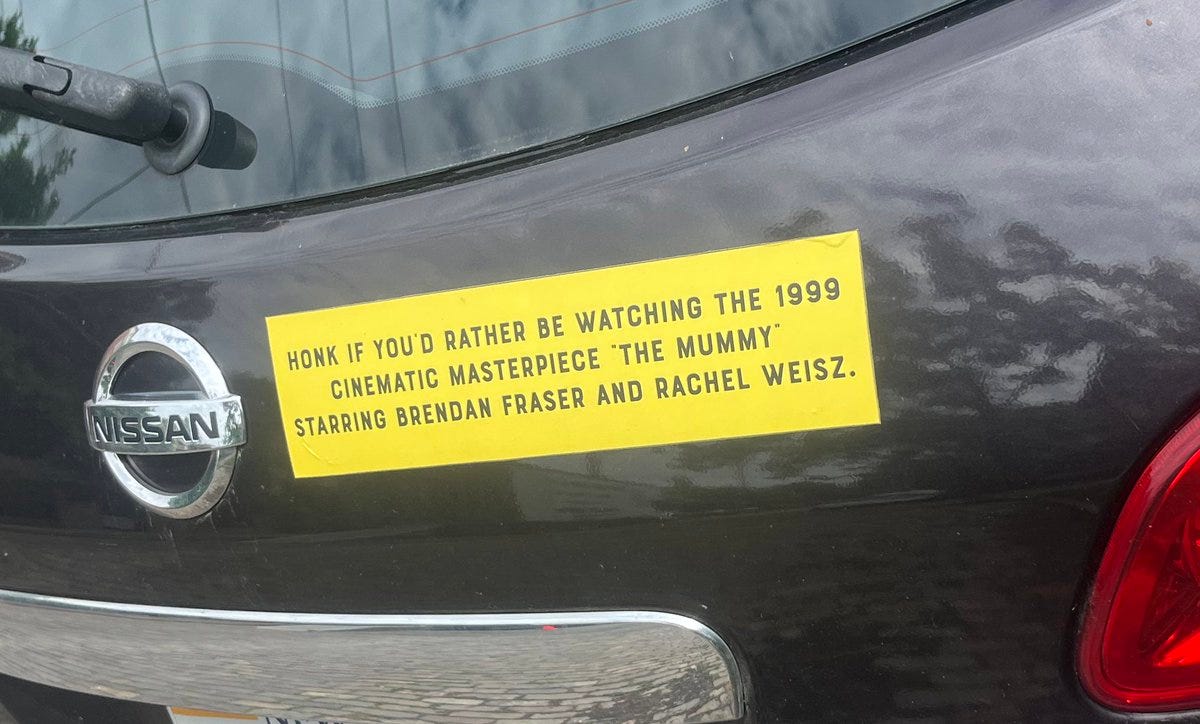
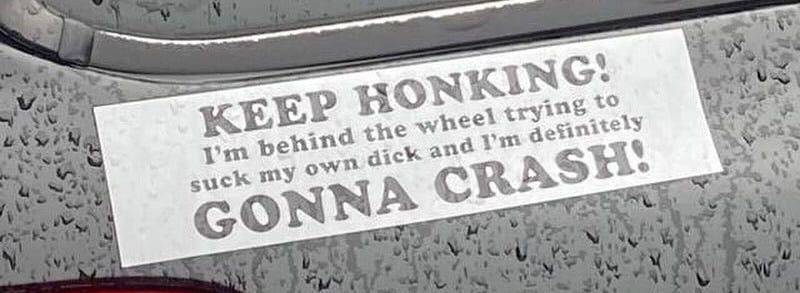
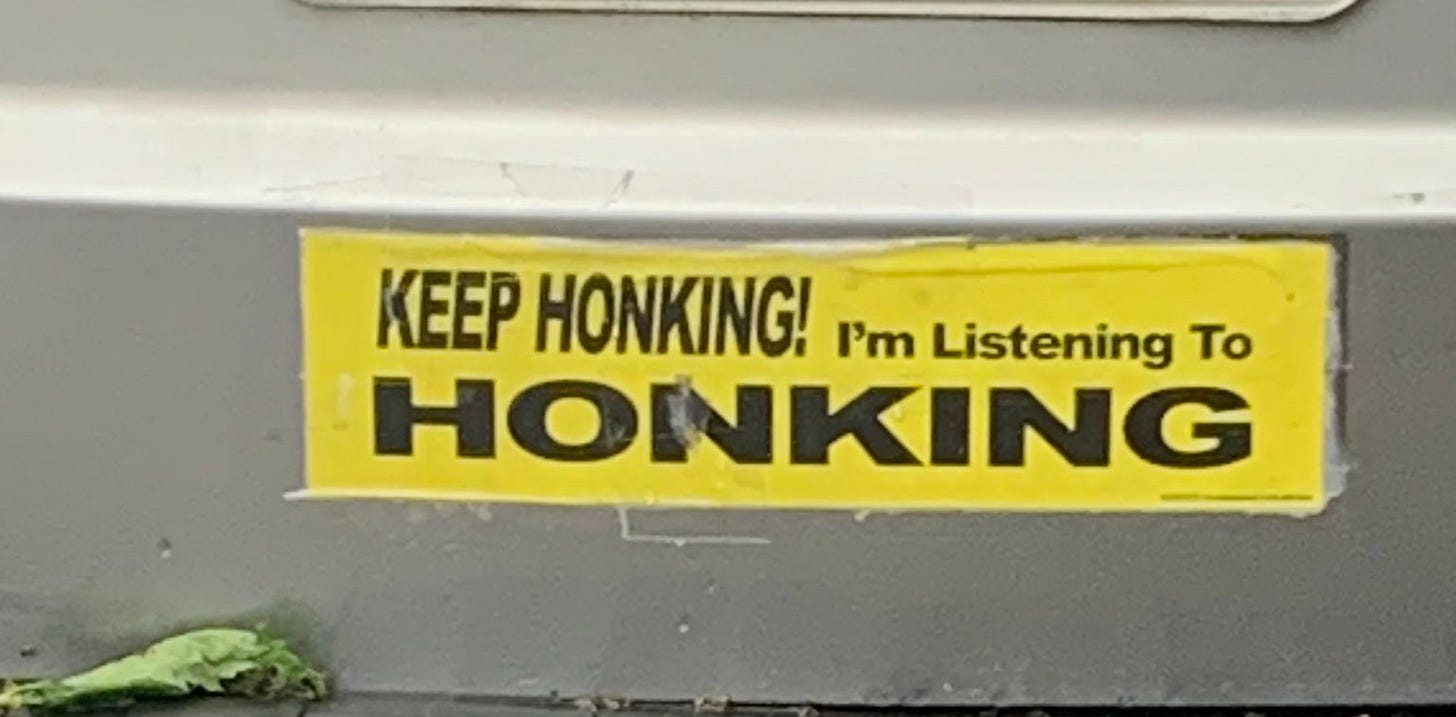
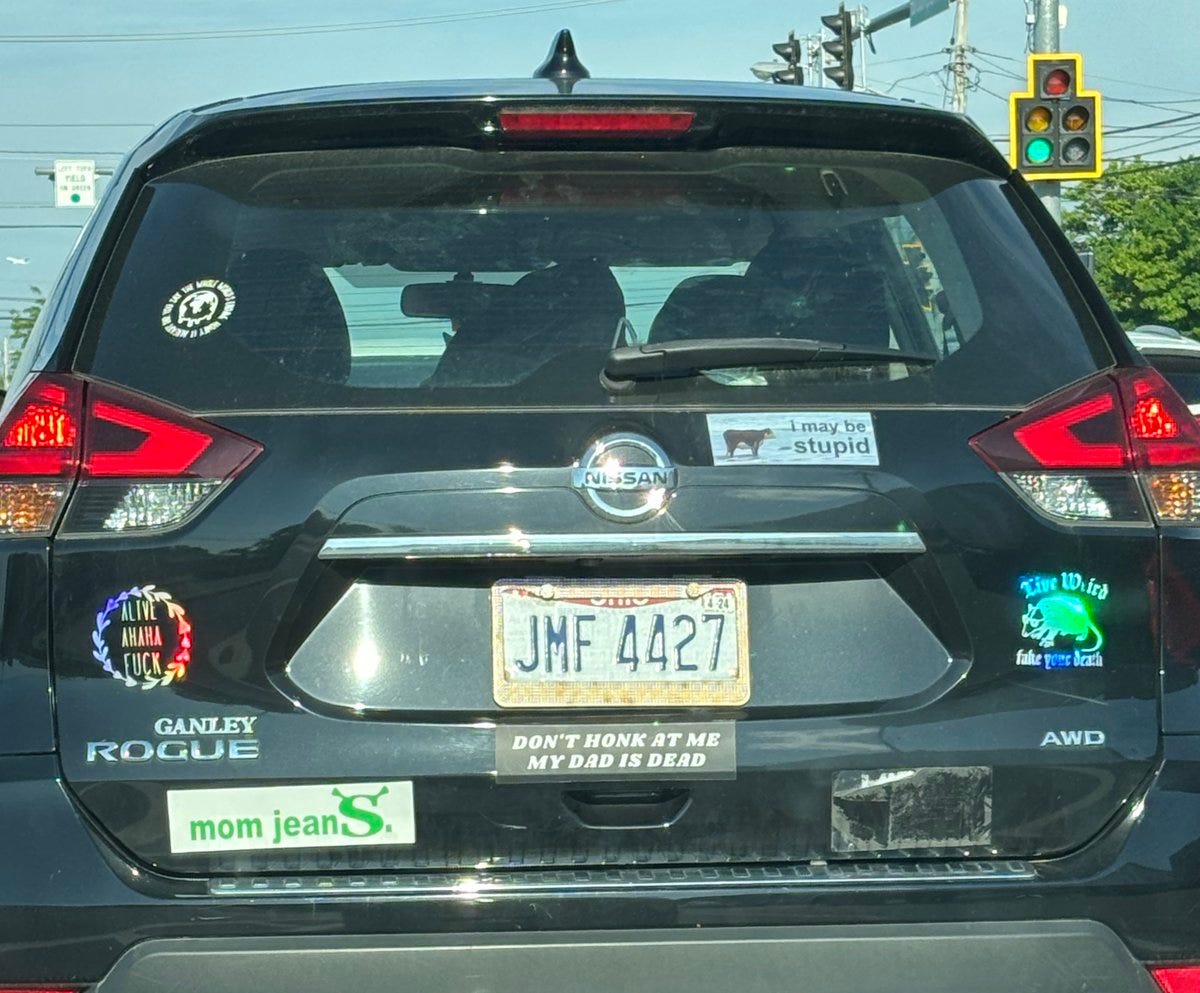
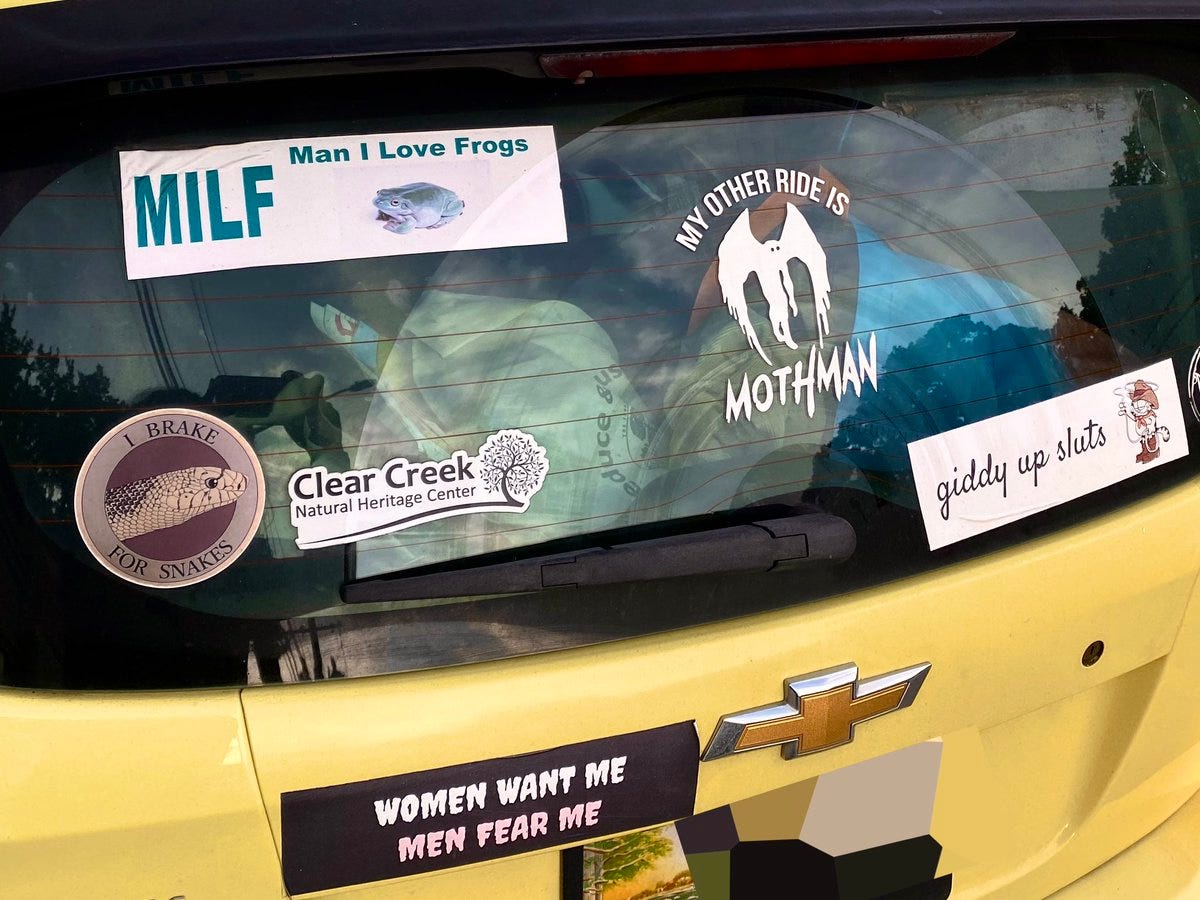
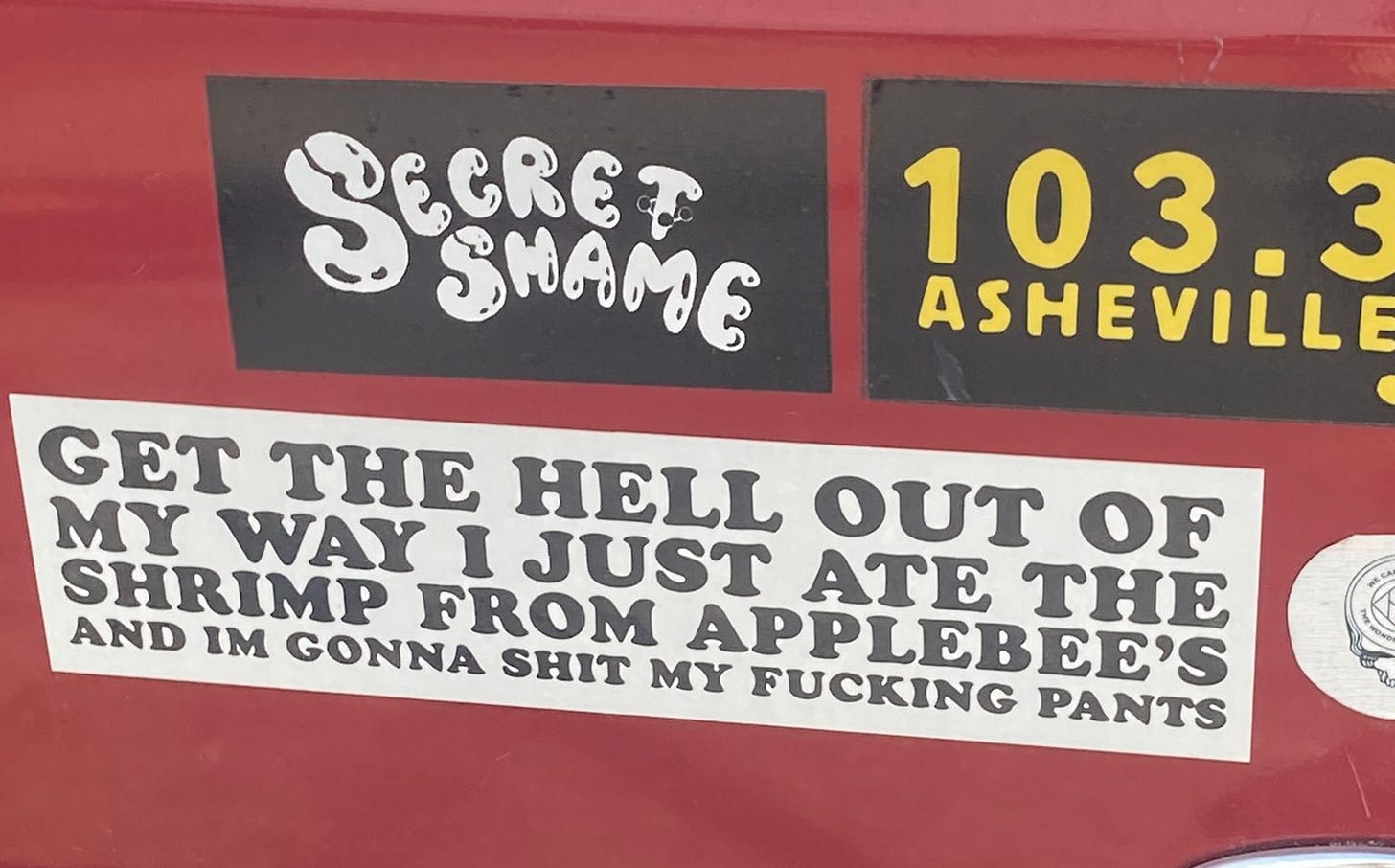
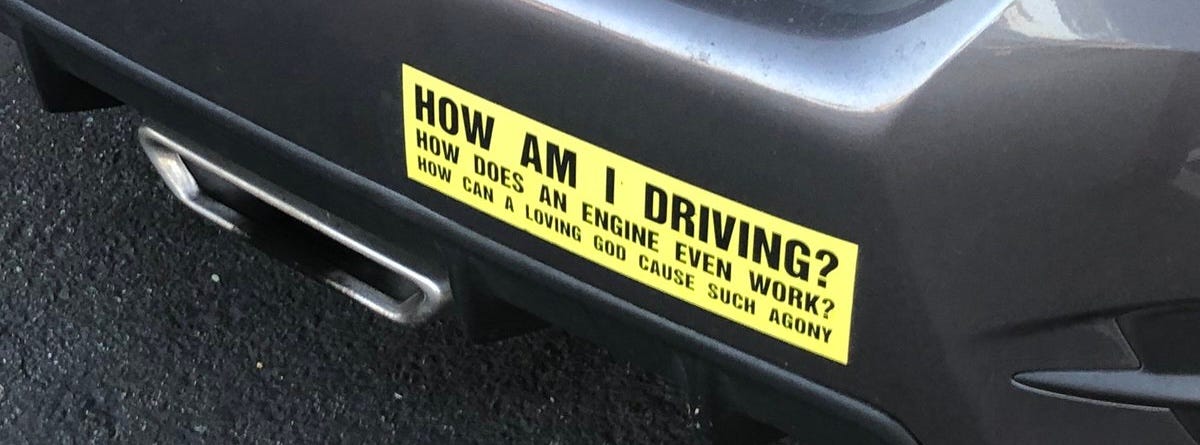


Thank you, Veronica. That was great.
Our old classmate is making bumper stickers for your phone, so those without an automobile can get in on the fun too. https://bumperstickers.blog